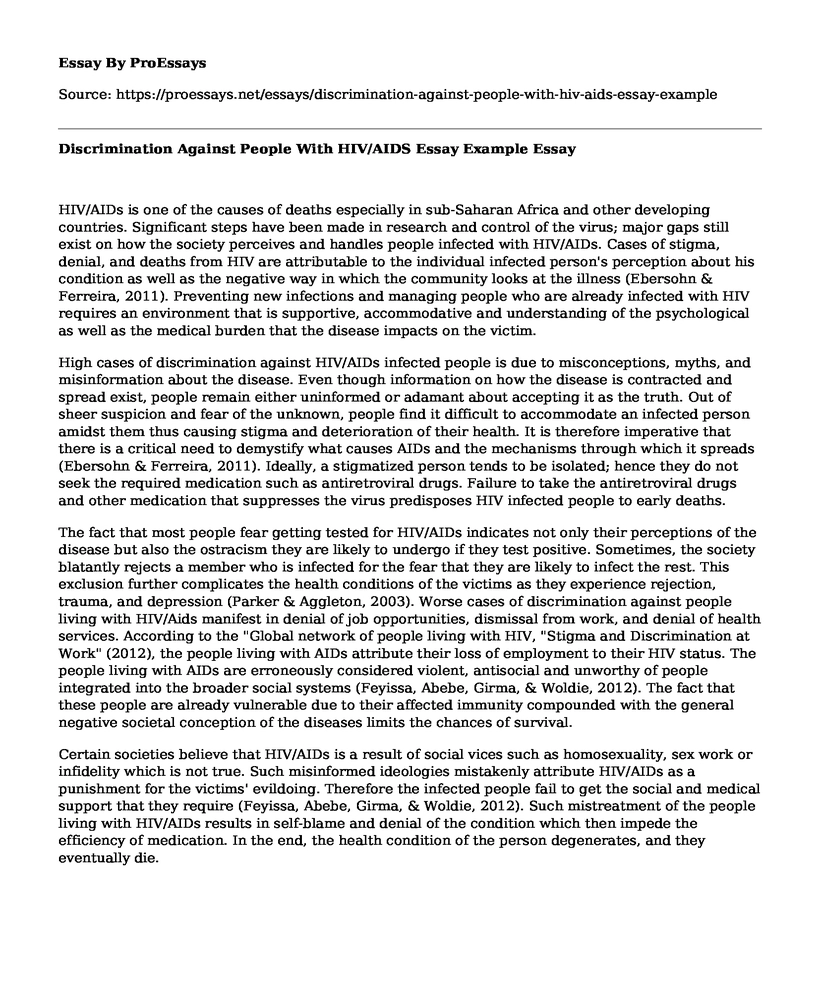HIV/AIDs is one of the causes of deaths especially in sub-Saharan Africa and other developing countries. Significant steps have been made in research and control of the virus; major gaps still exist on how the society perceives and handles people infected with HIV/AIDs. Cases of stigma, denial, and deaths from HIV are attributable to the individual infected person's perception about his condition as well as the negative way in which the community looks at the illness (Ebersohn & Ferreira, 2011). Preventing new infections and managing people who are already infected with HIV requires an environment that is supportive, accommodative and understanding of the psychological as well as the medical burden that the disease impacts on the victim.
High cases of discrimination against HIV/AIDs infected people is due to misconceptions, myths, and misinformation about the disease. Even though information on how the disease is contracted and spread exist, people remain either uninformed or adamant about accepting it as the truth. Out of sheer suspicion and fear of the unknown, people find it difficult to accommodate an infected person amidst them thus causing stigma and deterioration of their health. It is therefore imperative that there is a critical need to demystify what causes AIDs and the mechanisms through which it spreads (Ebersohn & Ferreira, 2011). Ideally, a stigmatized person tends to be isolated; hence they do not seek the required medication such as antiretroviral drugs. Failure to take the antiretroviral drugs and other medication that suppresses the virus predisposes HIV infected people to early deaths.
The fact that most people fear getting tested for HIV/AIDs indicates not only their perceptions of the disease but also the ostracism they are likely to undergo if they test positive. Sometimes, the society blatantly rejects a member who is infected for the fear that they are likely to infect the rest. This exclusion further complicates the health conditions of the victims as they experience rejection, trauma, and depression (Parker & Aggleton, 2003). Worse cases of discrimination against people living with HIV/Aids manifest in denial of job opportunities, dismissal from work, and denial of health services. According to the "Global network of people living with HIV, "Stigma and Discrimination at Work" (2012), the people living with AIDs attribute their loss of employment to their HIV status. The people living with AIDs are erroneously considered violent, antisocial and unworthy of people integrated into the broader social systems (Feyissa, Abebe, Girma, & Woldie, 2012). The fact that these people are already vulnerable due to their affected immunity compounded with the general negative societal conception of the diseases limits the chances of survival.
Certain societies believe that HIV/AIDs is a result of social vices such as homosexuality, sex work or infidelity which is not true. Such misinformed ideologies mistakenly attribute HIV/AIDs as a punishment for the victims' evildoing. Therefore the infected people fail to get the social and medical support that they require (Feyissa, Abebe, Girma, & Woldie, 2012). Such mistreatment of the people living with HIV/AIDs results in self-blame and denial of the condition which then impede the efficiency of medication. In the end, the health condition of the person degenerates, and they eventually die.
Conclusion
In conclusion, it is undeniable that HIV/AIDs impairs the immune system. This is because the virus severely damages the white blood cells which provide natural immunity. Therefore there is a need to use antiretroviral. Nonetheless, lack of information on HIV/AIDs contraction and spread entrench discrimination significantly impedes societal acceptance of the diseases. This results in dismissed chances of the victims surviving. Diminution in the form of denial of jobs, loss of employment, denial of treatment and exclusion from society contributes to the stigma which increases the chances of death from HIV/AIDs.
References
Ebersohn, L., & Ferreira, R. (2011). Coping in an HIV/AIDS-dominated context: teachers promoting resilience in schools. Health Education Research, 26(4), 596-613. https://doi.org/10.1093/her/cyr016.
Feyissa, G. T., Abebe, L., Girma, E., & Woldie, M. (2012). Stigma and discrimination against people living with HIV by healthcare providers, Southwest Ethiopia. BMC Public Health, 12(1), 522. doi: 10.1186/1471-2458-12-522.
Parker, R., & Aggleton, P. (2003). HIV and AIDS-related stigma and discrimination: a conceptual framework and implications for action. Social science & medicine, 57(1), 13-24. https://doi.org/10.1016/S0277-9536 (02)00304-0.
Cite this page
Discrimination Against People With HIV/AIDS Essay Example. (2022, Dec 06). Retrieved from https://proessays.net/essays/discrimination-against-people-with-hiv-aids-essay-example
If you are the original author of this essay and no longer wish to have it published on the ProEssays website, please click below to request its removal:
- Family and Healthy Living - Creative Writing Example
- Essay Sample on Personal Diet
- Essay Example on Gastrointestinal Tract: Functions and Disorders
- Essay on Promoting Self-Cannulation: Applying Watson's Theory of Caring to End-Stage Renal Disease
- Comparing Healthcare Solutions: Choosing the Best Management Vendor - Research Paper
- Organ Donations and Blood Donations: Increasing Numbers, Increasing Challenges - Research Proposal
- Essay on Strategic Policy Framework for Enhancing Cancer Care: Maximizing Quality, Minimizing Cost







